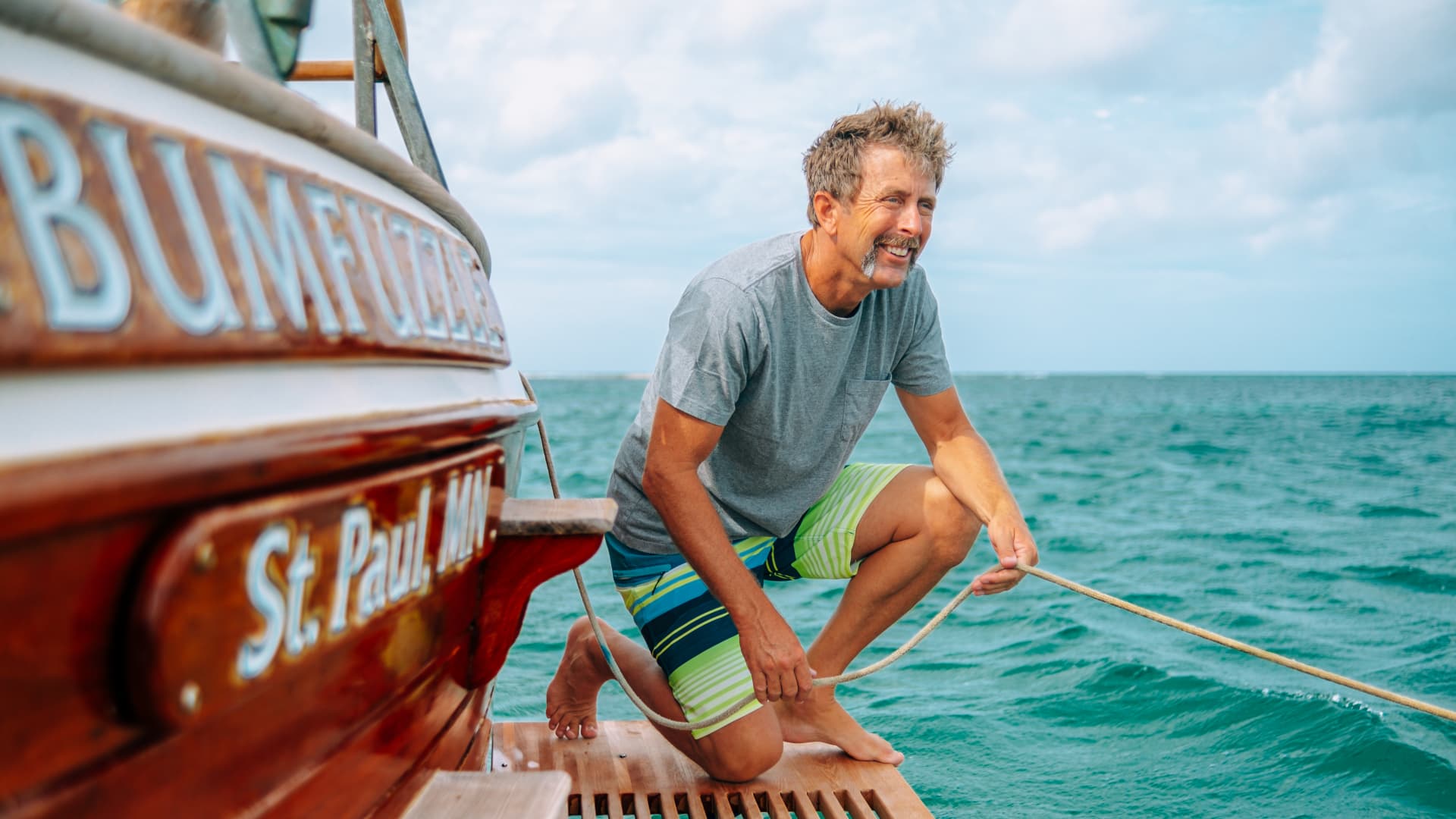Patrick Schulte said he’s wanted to be a trader since he was 15 years old.
He said he saw a clip of the New York Stock Exchange on the nightly news, and thought, “That’s what I’m going to do.”
He learned the ropes close to home at the Minneapolis Grain Exchange, before moving to Chicago, where he started trading corn, wheat and soybean options, gold, Dow futures — “a little bit of everything,” he said.
He was doing well, he said — and life was good. Soon his friends started having children and moving to the suburbs.
But Schulte said he and his wife, Ali, “weren’t quite ready for that.”
So they sold their belongings, bought a boat and set off to sail around the world, despite having no sailing experience, he said.
Traveling for 20 years
The couple left Chicago in 2003 and have been on the road ever since.
They sailed the world for four years, visiting 45 countries and learning to sail on the fly, he said. Soon, they were “addicted to the lifestyle,” said Schulte, who was working during their travels.
He called trading the “perfect” job for full-time travel because “all I need is a laptop, an internet connection, and I can be anywhere in the world.”
Eventually, they sold their boat and bought a restored 1958 Volkswagen bus, which they lived in for nearly two years, traveling from Alaska to South America, and later Europe, Schulte said.
Then Ali got pregnant. So they returned to Minnesota.
Schulte said his family was sure a child would make them settle down. Instead, they took a vintage 1965 Porsche, which had been in his family for decades, and drove to Mexico.
They had a daughter in Puerto Vallarta, then bought a second boat, before having another child and moving the family into a motorhome for a few years, Schulte said.
But the sea beckoned again, he said, and they spent five years — including the pandemic years — exploring the Caribbean and Central America, he said.
More recently, the couple bought another boat — their fourth — a catamaran that they intend to sail around the world, he said.
“The kids are the perfect age,” he said, adding that they are now preteens.
Paying for it all
A life of full-time travel may sound expensive, but Schulte said his family spends less money traveling than they would living in one place.
They don’t own much, he said, preferring to live a life that focuses more on experiences than possessions.
Plus, they don’t have access to Amazon, Starbucks and other places that “eat away at your finances,” he said.
During their first trip around the world, Schulte said he and his wife kept track of every dollar they spent, which averaged about $3,100 a month. Their biggest expenses were food, entertainment and fuel, he said.
But that doesn’t include a substantial boat repair they paid for during the trip, which cost more than $33,000.
Boats aren’t cheap to buy or maintain, but owners can save on other costs, said Schulte.
With his sailboat, “fuel expenses were low. And the vast majority of the time we were anchored for free in the places we visited, so there were no lodging or campground expenses,” he said.
Schulte said he paid $157,000 for his first boat, which he sold four years later for $140,000. But Schulte said he’s made money on other boats that he bought and sold.
“It’s all kind of a wash in the end,” he said.
Teaching others to trade
Schulte said many people have asked him about his profession and lifestyle through the years, so much so that he teamed up with a friend to write a book called “Live on the Margin.”
But there’s only so much you can teach in a book, he said. So in 2016, he published a post to his blog, Bumfuzzle, offering to teach people to trade options.
“I was blown away by how many people jumped at the chance,” he told CNBC Travel.
He eventually launched a business, Wanderer Financial, to teach people about investments, including total beginners, he said. He also posts his live trades for people to follow.
But perhaps the biggest draw — and one that he enjoys the most — is the daily live chat he hosts before the market opens.
It’s also cured one of the hardest parts of being a solo trader, he said — the solitude.
“It’s nice to have a group and be able to bounce stuff off each other,” he said. “Plus, there’s not always something to do — we’re not day trading … so there’s plenty of talk about life and travel.”
Learning the lifestyle
Schulte said most of the people who contact him want to learn how to trade to travel full time.
“They’re either already living this lifestyle, similar to mine — living on a boat somewhere or motorhome somewhere — or there’s striving for that,” he said.
He’s clear about one thing: Newcomers should have realistic expectations.
“It’s great way to earn a living,” he said. But “I don’t think anybody’s going to turn $1,000 into $1 million. I’m not going to pretend like you can just magically make huge sums of money.”
His advice to those interested in trying it: Don’t wait until it’s too late.
Many people focus on fulfilling their dreams after they retire, he said. But “parents get old … your hip goes [out]… there are just no guarantees.”
Schulte said that’s why he’s into “mini retirements” or “pre-retirements.”
“Go off and do that big thing. Take the year, take the two years, do something big that you’ve always wanted to do,” he said. “Don’t put it off forever.”
Anything else?
“Learn to live simpler,” he said. “Once you embrace that, then all sorts of possibilities open up.”
